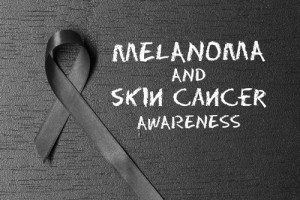Skin Cancer Awareness and the Three Important Types of Skin Cancer
Posted May 11, 2016 in Skin Cancer
 More than a quarter of us will develop skin cancer during our lifetimes! Of course, cancer is not something to be taken lightly, but it does not have to mean that one’s life is over. Many varieties of cancer can be completely cured with effective treatment. Since May is Skin Cancer Awareness Month, it is appropriate we recognize the three important types of skin cancer and how they can be treated.
More than a quarter of us will develop skin cancer during our lifetimes! Of course, cancer is not something to be taken lightly, but it does not have to mean that one’s life is over. Many varieties of cancer can be completely cured with effective treatment. Since May is Skin Cancer Awareness Month, it is appropriate we recognize the three important types of skin cancer and how they can be treated.
Skin Cancer
Skin cancer is the most common type of cancer and affects more than 25 percent of Americans during their lifetime. While those with fairer skin are more susceptible to developing skin cancer, it can occur in anyone, especially those with long-term sun exposure. There are three important types of skin cancer: basal cell carcinoma, squamous cell carcinoma, and malignant melanoma. Each of these can be treated and cured if diagnosed early enough.
Basal Cell Carcinoma
Basal cell carcinoma (BCC) is the most common type of skin cancer and affects 20 percent of North Americans. BCCs often occur in the head, neck, and other areas of the body that are frequently exposed to the sun. A BCC will usually look like a raised red papule with small veins on its surface, possibly surmounted by a small ulcer. Complete surgical excision can provide successful treatment for BCC. This type of skin cancer is rarely fatal and does not spread to other parts of the body but recurs if not completely excised. BCC can also be highly disfiguring if neglected, when it may go on to destroy facial features such as the lip, eyelid, or nose. Occasionally, a skin graft or local tissue rearrangement may be required to achieve the best cosmetic results after removal of a BCC.
Squamous Cell Carcinoma
Squamous cell carcinoma (SCC) is the second most common type of skin cancer and often occurs on the face, hands, and forearms. An early form of SCC may appear as keratosis, a small and yellowish-brown warty growth with a rough texture. Invasive SCCs that have grown to two centimeters or more in size tend to spread through the lymphatic system to the rest of the body. Therefore, it is best to consult a plastic surgeon right away if you suspect that you have an SCC. Like BCCs, SCCs must be removed through total surgical excision. Direct closure of the wound is always preferable, but with larger defects it may again be necessary to utilize skin grafts or some form of local tissue rearrangement. SCCs are more aggressive than BCCs and should always receive prompt attention.
Malignant Melanoma
Fortunately, malignant melanoma (MM) is far less common than BCC or SCC, but it is one of the most deadly forms of cancer known to man. An MM may occur in sun-exposed areas or even underneath a fingernail or on the bottom of your foot. An MM will look like a jet-black mole with irregular pigment, and it may have a tendency to bleed. MMs will spread through the lymphatic system or bloodstream, rapidly involving the lymph nodes and eventually the internal organs. Thicker MM lesions have a greater risk of metastasizing, so it is vital to catch them before they become large. Surgical excision is necessary and should be done as early as possible. Often, it is necessary to remove lymph nodes when they are involved. If left unchecked, MMs rapidly become fatal.
 Skin Cancer Prevention
Skin Cancer Prevention
It is important to regularly inspect your skin for any sign of the above skin cancers. Prevention of all of these three types of cancer consists of limiting sun exposure and applying sunscreen regularly (beware, even ‘waterproof’ sunscreen wears off in two hours!). Those who have had more than five severe sunburns in their lifetime have double the risk of developing melanoma. To protect yourself against ultraviolet radiation and lower your risk, limit tanning, wear a hat, and apply sunscreen (SPF 15 or higher) every couple of hours while outdoors. Avoid tanning salons at all costs!
If you are concerned that you may have skin cancer, schedule your consultation with Dr. Brian Boyd today. Dr. Boyd is an expert in skin cancer treatment and post-surgical reconstruction. Call our office at (310) 597-4734 or fill out our online contact form today and we will help you schedule your appointment.